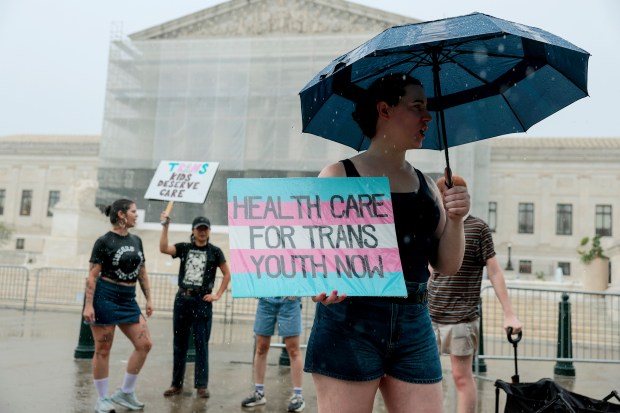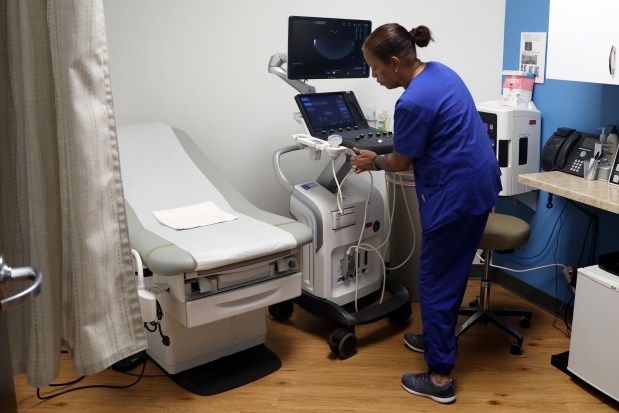Planned Parenthood of Illinois has named a new leader — a change that comes as the organization faces a barrage of threats, including a yearlong loss of federal Medicaid dollars.
Adrienne White-Faines will be the new president and CEO of Planned Parenthood of Illinois starting in early September. Most recently, she’s worked as chief strategy officer for the American College of Physicians. The longtime South Side resident was also previously CEO of the American Osteopathic Association, and worked for Northwestern Memorial Hospital earlier in her career.
“I can’t imagine a world where individuals, women, children, teens and anyone didn’t have access to comprehensive reproductive health,” White-Faines said. “After the reversal in 2022 of Roe v. Wade, somewhere, somehow, I knew I would not rest in my career leaving a situation like that.”
Planned Parenthood of Illinois provides a range of services across its 13 health centers, including medication and procedural abortion, birth control, gender-affirming care, testing and treatment for sexually transmitted infections and cancer screenings. It also offers, through its app, birth control, UTI treatment, at-home sexually transmitted infection testing, abortion medication and emergency contraception.
White-Faines, who sat on that Planned Parenthood of Chicago board in the past, joins the organization at a tumultuous time. President Donald Trump and his administration have been taking aim at services provided by Planned Parenthood as well as its funding.
Much of the threat to the organization stems from the “One Big Beautiful Bill Act” signed into law earlier this month. That bill included a provision that would prohibit federal Medicaid dollars from going to Planned Parenthood for a year. Medicaid is a state and federally funded health insurance program for people with low-incomes and disabilities.
A federal judge in Massachusetts issued a preliminary injunction Monday prohibiting the federal government from defunding some, but not all Planned Parenthood organizations while a case brought by the Planned Parenthood Federation of America and others proceeds. The injunction does not apply to Planned Parenthood of Illinois, the organization said Tuesday, meaning its Medicaid funding is still on the chopping block.
More than 40% of Planned Parenthood of Illinois’ patients – or nearly 30,000 people – are on Medicaid. The organization stands to lose about $4 million if it can’t get federal Medicaid dollars for a year.
“We continue to serve Medicaid patients and have contingency plans in place to temporarily cover the costs for patients,” Planned Parenthood of Illinois said in a statement this week. “We will continue to do this as long as possible.”
Planned Parenthood of Illinois faces other major threats as well. The bill, overall, is expected to cut about $1 trillion from Medicaid across the country over the next 10 years to help pay for tax cuts and enhanced border and national security, according to the Congressional Budget Office. Millions of people are expected to lose Medicaid coverage over the next decade.
Health care providers that see large numbers of patients with Medicaid, such as Planned Parenthood of Illinois, have been bracing for fewer dollars because of those cuts and coverage losses.
“Academic medical centers, teaching hospitals, foundations, they’re all looking to figure out how do we hold our mission high and yet at the same time navigate through these turbulent waters,” White-Faines said.
White-Faines said she hopes to work with those organizations and other groups to come up with solutions.
“Planned Parenthood is committed to continue to provide care,” White-Faines said. “We don’t have a choice and we will not to any degree possible leave patients in the wind. … We will have to look for alternative funding sources. We’ll have to dig deep in our philanthropy, but we’re going to have to work to find long-term sustainable solutions.”
Also, the Trump administration has been waging a battle against gender-affirming care, which is among the services provided by Planned Parenthood of Illinois.

Trump issued an executive order earlier this year instructing the secretary of the U.S. Department of Health and Human Services to take action, potentially related to Medicaid and other programs, to end gender-affirming care for people younger than 19. The order also told federal agencies to ensure that institutions, such as hospitals, that receive federal research grants stop offering gender-affirming care to people under the age of 19. The order sought to stop the use of medications to delay puberty, hormone therapy and surgery for people under 19.
In response, Lurie Children’s Hospital and Rush University System for Health have scaled back their offerings for minors seeking gender-affirming care, and UChicago Medicine said last week it would end gender-affirming pediatric care.
Those changes at other Chicago institutions could mean more demand for gender-affirming care for minors at Planned Parenthood, White-Faines said. Though Planned Parenthood of Illinois offers gender-affirming care for minors such as hormonal therapy, it does not provide gender-affirming surgeries.
Because of the threats to their funding, other local health care providers “had to make decisions to begin to cut back on their delivery of services,” White-Faines said. “That doesn’t change the fact that it is an effective, needed medical provision and service and Planned Parenthood has provided it and will plan to continue to provide it.”
The organization faces other challenges as well.
In January, Planned Parenthood of Illinois announced plans to close four clinics in Englewood, Ottawa, Decatur, and Bloomington. At the time, the organization cited a financial shortfall caused by rising health care costs, more patients needing financial assistance and uncertainty under the Trump administration.

Illinois has also become a destination for abortion-seekers across the country, since the U.S. Supreme Court overturned Roe v. Wade, leaving it up to individual states whether to keep abortion legal. In 2024, more than 35,000 people traveled to Illinois from other states for abortion care, according to the Guttmacher Institute.
Since that Supreme Court decision, Planned Parenthood of Illinois has seen a 47% increase in overall abortion care patients, with out-of-state patients making up nearly a quarter of its overall abortion patients, the organization said in a January news release.
The higher numbers of patients, combined with low reimbursement rates from insurers and a higher cost of care forced Planned Parenthood of Illinois to “realign its health centers and staffing,” the news release said at the time. The organization said at the time it was downsizing its administrative staff but has not provided any details about how many people were affected.
“When demands change and when the circumstances change you have to allow yourself to open up your lens to other possibilities,” White-Faines said. “You have to look forward and start to design for what is and what will be, and that’s what we will do as I walk into Planned Parenthood.”
She said she’s ready to face the massive threats looming over Planned Parenthood of Illinois.
“The very foundational things that Planned Parenthood does, health care delivery, education, advocacy and research they’re all facing massive headwinds,” White-Faines said, “but for me, that’s not unusual because if you look historically throughout the U.S. history, it is areas of the most dramatic disruption that actually bring about the most progressive solutions.”
White-Faines has long been interested in improving health care from the inside out.
Growing up in inner-city Milwaukee, she watched her dad work as a dentist alongside six other Black providers.
“Actually watching what they did in terms of their commitments to the health and wellbeing and welfare of the community made me realize that the system itself was really flawed,” White-Faines said. “They put the community on their backs and they worked 24/7 supporting patients and activities and that’s the environment I grew up in, is that you give it your all to help others.”
She said she initially planned to go to medical school but realized she could do important work, helping clinicians and health systems evolve and better serve their communities by working on policy and operations.
White-Faines will also serve as president and CEO of Planned Parenthood Illinois Action, which is the nonpartisan advocacy and political arm of Planned Parenthood of Illinois.
